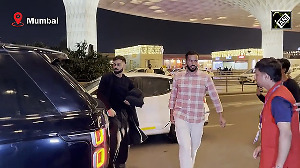For Indians and India watchers an odd lull, at least in public, seems to have overtaken policy makers in South Block in matters pertaining to the United Nations and its Security Council. An issue that ought to seize policy makers at the ministry of external affairs is the long sought and ultimate foreign policy prize -- a seat at the powerful Security Council.
Aside from providing India its rightful place among in the comity of nations it would likely be a strong impetus for regional piece in Asia. But other than a curiously reciprocal effort at supporting Japan in a quixotic bid for a seat in the Security Council there has been no movement or comment from New Delhi. Not even the appointment of a new Chief Military Observer of the UN force 'observing' the Line of Control between India and Pakistan in Kashmir brought forth a response.
The last aspect is unsurprising. Indians of all stripes have always been loud in their denunciations of the world body's role along the LoC. That, of course, assumes their being aware of the presence of the United Nations Military Observer Group in India and Pakistan better known by its awkward acronym UNMOGIP.
The appointment of Major General Guido Palmieri of Italy as CMO most likely does nothing to raise Indian enthusiasm for this near secretive force. Appointed in its original more limited form only a year later than the peacekeeping force that keeps the 'truce' in the Middle East in 1948, UNMOGIP has proven to be, from an Indian standpoint, an unremitting thorn in holding the LoC.
Indian army personnel have for long complained about Pakistani sponsored infiltrators crossing the LoC even occasionally using UNMOGIP as a cover. Statements like that from the current head, Jean-Marie Guehenno, reported earlier this year in the Pakistan Times categorically asserting the absence of infiltration also do nothing to dissuade Indians of their belief that UNMOGIP is a partisan set up inimical to India.
In the absence of any public record it is hard to discern the leanings if any of the new appointee. General Palmieri attended the Artillery Officers School and Command and Staff Colleges in Quetta, Pakistan. While he did serve as an assistant military attache in New Delhi subsequently does his close interaction with Pakistan's military imply an inability to be impartial? Probably not, but if history is any guide, Western army officers who cohabit with Pakistan's military establishment remain receptive to their erstwhile colleagues long after their tenure in that country. It is that variant of the Stockholm syndrome that has enabled many of them to establish an enduring rapport with the US military over the last several decades.
It is only in the aftermath of the Afghan war of 2001 and the current situation along the border with Afghanistan that much of that fondness has ebbed causing a rethink among many some senior US officers. Most of that stems from the frequent attacks from across Afghanistan's eastern border some allegedly abetted by middle ranking Pakistani army officers.
What, if any, are the benefits of a seat at the exclusive table in Turtle Bay?
Apart from lending a greater voice in conflict resolution worldwide will a seat at the UNSC give India more of a say in ridding the thorn in its midst? Maybe so, but at a minimum, it cannot make the situation worse with regard to Pakistan and Kashmir.
So why do the mandarins of South Block appear to be waning in their vigour to bid for a seat at the Security Council? As always, the answer may be in that there is a lack of support from the US and Britain.
With the US in full election mode, it is unlikely that any attention is given to India's quest.
Britain, on its own, is no more likely to advance the Indian cause than a new resolution on Iraq. In addition, there is the simmering matter of supposed bribes in the Iraq oil-for-food controversy that swirled earlier around the UN's very top echelons earlier this summer. While the secretary general has no vote in the process, the scandal and conflicts in Darfur and elsewhere are unlikely to cause any bold move on his part to support India's application actively.
Indeed, given the history of post-war conflict, there is arguably never is a propitious time to advance India's case for a seat.
While that in itself may be reason to press ahead right now there are some clear positives for India to capitalise on. These include India's repeated restraint in the face of continued terrorism by jihadis from across the border. That restraint has clearly been carried on by the new government in Delhi and gives them even greater legitimacy given the domestic compulsions that may have called for a more hardline stance against the Western neighbour.
Lastly, if Japan with a government that totters not infrequently at home can see fit to pursue a seat on the singular basis that they are not nuclear armed, India has a clincher as the world's largest democracy with no history of armed conflict against another nation





